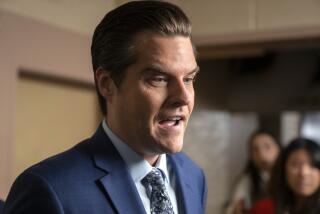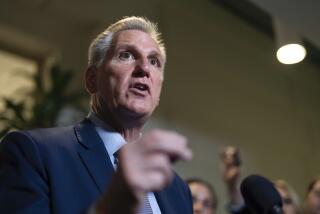At the Heart of McCain’s Quixotic Fight: His Ambition
- Share via
This year’s McCain-Feingold legislation is to campaign finance reform what the Hillary Clinton health care bill of 1994 was to health care. That is, the germ of a good idea might be in there somewhere, but the legislation is so complicated and controversial that it has little chance of becoming law.
But everyone, on all sides of the debate, will go through the motions anyway; after all, politics is mostly theater. And the leading actor, Sen. John McCain (R-Ariz.), might seek the starring role in 2004.
Washington is confronting many serious issues, most obviously the weakening economy. The House already has passed a tax cut that could help, but action in the Senate will have to wait as the world’s greatest deliberative body wastes two weeks deliberating McCain-Feingold.
Why? As Sen. Mitch McConnell (R-Ky.) says, the push for McCain-Feingold “is being driven by the New York Times and the Washington Post.” That’s a slight overstatement, insofar as most other big newspaper editorial boards and big-foot reporters are in on the act, too.
In last week’s Newsweek, for example, Jonathan Alter wrote that “McCain’s aim is to trade on his rock-star status.” Strategizing on behalf of the Arizonan, he added: “He needs his old allies in the press. If the media could devote a fraction of the passion and time to the causes of the disease that it lavished on the John Huang-Marc Rich-Lincoln Bedroom symptoms, real change might even be possible.”
Of course, Alter’s examples prove the opposite of McCain’s argument that new laws are needed. It is already illegal to funnel campaign money in from foreign countries, as Huang allegedly did, or to buy a pardon, as Rich’s ex-wife allegedly did, or to rent out the Lincoln Bedroom, as the Clinton White House allegedly did. No matter, McCain’s “allies” in the press have come through again. The New York Times, Washington Post and the Los Angeles Times led with pro-McCain-Feingold editorials Monday.
As Sen. Robert Torricelli (D-N.J.) said over the weekend, “There is a national panic being created that’s the political equivalent of the Spanish-American War.” The media are insisting, he declared, that every ill in American government is the result of soft money. Yet these stories, he added, “are written or conceived by people who know very little about the political process or fund-raising.” Torricelli’s historical reference, of course, was to the events of 1898, when the press goaded the U.S. government into a dubious war with Spain.
Today, the media have consummated an alliance with McCain, the Reagan Republican-turned-media darling, based mostly on this one issue. So as long as McCain plays to the media feeling that “money in politics” is America’s problem--and as long as he aims barbs mostly at fellow Republicans--he is rewarded with ink and air time.
But then-First Lady Hillary Clinton got a lot of positive attention too, and that didn’t help her enact her health care plan seven years ago. And so it is with the McCain-Feingold legislation, which would ban soft money and restrict independent free speech. This year, many big Democratic groups, such as the AFL-CIO, have changed their stance, perhaps because they actually read the fine print and realized that their 1st Amendment rights too would be squelched if McCain-Feingold became law.
Normally, faced with such hurdles, a lawmaker would seek compromise. But McCain is not a normal lawmaker. Never much liked by his colleagues, he plays to the press instead. Indeed, the Los Angeles Times reports that Republicans inside and outside the McCain camp speculate that he might bolt the GOP and run for president in 2004 as an independent.
McCain will be 68 then; he might think it better to go out with the bang of a presidential bid than the whimper of seeking reelection to a fourth Senate term. By this reckoning, McCain would be better off if his bill loses, as defeat would give him a rationale for running. And so long as he says what editorial boards and journos want to hear, he will likely be rewarded with glowing coverage.
But could McCain really win the White House? The odds would seem to be against him, but then nobody thought that Hillary Clinton would rise so high from the ashes of her own failed legislative crusade.
More to Read
Get the L.A. Times Politics newsletter
Deeply reported insights into legislation, politics and policy from Sacramento, Washington and beyond. In your inbox twice per week.
You may occasionally receive promotional content from the Los Angeles Times.









